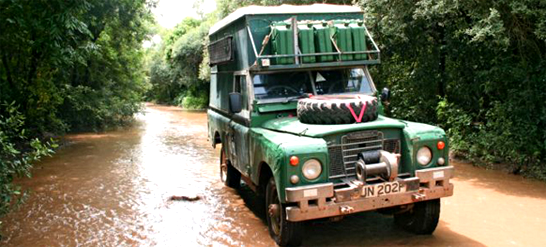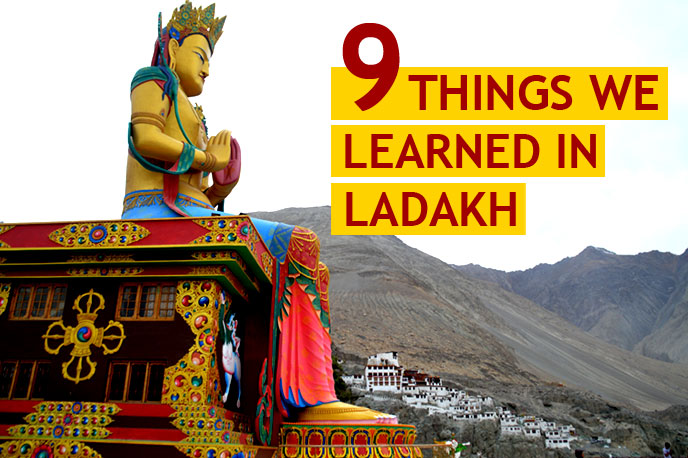
Some choose to avoid travel altogether. It seems… dangerous? Expensive? Intimidating? Or maybe it’s just that the comforts of home can be so damn comforting. They hypnotize us into staying put.
Others venture out — but just barely. They dip their toes in the water, and it refreshes them, but soon they’re tapped out. Travel becomes a series of vacations, experienced in two week increments. Anything more than that and it feels like work.
Then there are the wild ones, the ones who leave and never really come back. They may visit, they may even spend a fair bit of time at home. But they’re restless and anxious, the road is in them. Comfort feels like stagnation and the old foot-itch never seems to let up.
The perpetual traveler is an interesting breed — bold, intrepid, brave — and even among career vagabonds, Christopher Many stands alone.
Having spent the past 19 straight years on the road, Many holds a point of view few can relate to. His first book, Left Beyond the Horizon, sees him roaming across 125,000 miles of track over the course of 3,000 days as he enjoys the ultimate road trip in a Land Rover he purchased for 1,000 euros in the Scottish highlands.
His second book, arriving this time next year, follows Many and his partner, Laura Pattara, as they travel the ancient Silk Road from Europe to Central Asia, across the Pamir Mountains into China (where they become the first overlanders with a foreign vehicle to obtain legal permission to transit the “Middle Kingdom” unescorted). Four years later they arrive in Bali, Indonesia – the shipping port to Australia where they plan to finish their journey by driving across the outback.
Right now, Many is still in the thick of it. The weeds, so to speak. He’s off adventuring, sharing stories over campfires and broken axles. During a Malaysian pit stop, the author took the time to chat with Uproxx about his outlook on a world he still feels he hasn’t seen enough of.

Where, specifically, are you right now?Right now we’re in the historic town of Malacca, on the west coast. But tomorrow, I believe, Laura and I will head back up to Kuala Lumpur. Toward the end of January we’ll catch the passenger ferry from Port Klang (Malaysia) to Indonesia – it’s only a four hour boat ride, and our motorcycles can get tied down on deck. Around September 2016, we should be in Bali or East Timor, from there we can ship to Darwin, Australia.
The image below really jumps out at the viewer. Is there a story there?

Oh yes — the burning boat in Berbera, Somaliland, in September 2009. The body of water in the background is the Gulf of Aden, and on a very clear day, you can see Yemen on the horizon. Yachts and ships are quite regularly capered and sunk off the coast by pirates – if this happens to a western vessel, you might even hear about it on CNN. But otherwise, Somaliland rarely makes an appearance in our media, to the effect that – unless you’ve traveled to the Horn of Africa – most westerners confuse Somaliland with neighboring Somalia. The former declared independence from the latter in 1991, almost a quarter century ago, and still hasn’t received UN recognition. Without that, their currency – the Somaliland Shilling – is not traded by the World Bank, their democratically elected president is not invited to any summit, and imports/exports are difficult (since their government lacks international legitimacy).
You can imagine what this means for the civilian population. Somaliland’s economy is in tatters, and many have a hard time making ends meet. We visited for a few months and had a great time. In my opinion, it’s one of the most hospitable countries on the planet! It’s a shame the voices and problems of ordinary civilians in Somaliland are never heard in the West.
For the sake of my Somali friends, I hope this changes in the near future
In a previous interview you mentioned you can stay on the road for $6,000 a year. Did it take you a while to whittle down to that budget and figure out a routine?

It seems gas alone would bump you up to a few thousand…
Oh, I know many travelers who vagabond with their vehicles around the world on far less than $6,000 a year! Spending MORE is, of course, never a problem. I’d call myself a “mid-range” overlander.
In essence, at least 13 variables determine your trip budget:
- Which countries will you be visiting? When travelling from Cairo to Cape Town, Alaska to Patagonia or Europe to Nepal, prices for daily commodities such as food and fuel vary widely from one country to the next. A gallon of gasoline in Venezuela, for example, costs less than 10 cents; in Turkey, however, it’s around $9.
- How often will you ship your vehicle between continents? If you include Australia on your RTW itinerary, you need to ship 4 times in order to “touch down” on every continent.
- For which countries will you require visas? I visited 100 countries with my Land Rover, and many necessitated a visit to an embassy. Visa (and visa-extension) costs add up.
- Will you be travelling alone, as a couple, or in a group?
- How long will you be on the road?
- What’s your vehicle’s fuel-consumption?
- What’s YOUR “fuel” consumption? Ah, that precious beer after (or during) a game-drive in the Serengeti! It doesn’t seem like an expense, until you have another at your campground, another before bed …
- How often will you be bush-camping, free of charge? In Argentina, Bolivia, Mongolia and Namibia … why not always?
- Do you plan to visit every attraction or partake in costly “adventure” activities?
- Will you cook yourself, or eat mostly at restaurants?
- Are you a mechanic? Your vehicle WILL break down sooner or later (sooner if you have a Land Rover, later if you drive a Toyota). The question is: can you do all the repairs yourself?
- What insurances and other travel-documents do you deem necessary?
- How often will you be robbed?
Your travel-speed plays a huge role. I probably couldn’t live on $6,000 per year if I travelled any faster. Why? Well, remember that the combined costs for fuel, visas, shipping and flights can easily amount to HALF of your trip’s budget. Irrespective whether you conclude your voyage in a year or ten, the grand total of these expenses remains the same. But what you can influence is your average expenditure per year. For example: an overlander who rides his motorcycle from Europe to Australia might cover 30,000 miles, including a few detours. If his bike’s consumption is 40mpg, and the average fuel price is four dollars per gallon, he’ll need to budget $3,000 for fuel alone. Let’s assume he obtains all the permits to cross China for $2,000, spends $500 on visas for the two-dozen countries on his route, and the shipment of his bike (including his own airfare) from Indonesia to Darwin costs another $1,000. That’s $6,500 all up … a hefty sum for a one-year journey!
However, if the overlander takes things slowly, and covers the distance over four years (like I am doing), his average annual expenditure drops to a reasonable $1,625. On top of that he’ll only need to cover the costs for food, accommodation and insurances, which are proportionate to his trip’s duration. In the end, a four year motorcycle trip is only twice as expensive as a one year journey, NOT four times!
If you now subtract $1,625 from $6,000 and divide the remainder by 365, this leaves me with almost $12 per day for food an accommodation … which is more than enough, since I usually cook my own meals and camp for free in my tent. On my Land Rover journey, the situation was much the same. Whereas my Landy’s fuel consumption was higher, the trip lasted 8 years instead of only 4. Hence, my average annual expenditure was nearly identical.
On your website you describe Left Beyond the Horizon by saying “Soon enough the adventure turns into a sprawling n-dimensional tapestry of philosophical conundrums, roller-coaster emotions and first-hand observations in 100 countries.”
What are some of those philosophical conundrums for you?
Meeting people of different backgrounds bursting with unique stories and ideas is one of the greatest rewards of travel. No two individuals are ever the same; and although I often find certain similarities, never have I encountered clones with identical beliefs, thoughts, philosophies and dreams. Every human being is one of a kind. Realizing this has consequences: travelers lose all faith in anthropological constants. Nothing is universally believed, there is no unanimous agreement upon “right and wrong”, no collective moral or ethical standard and no religion common to all.
Visitors to any corner of the globe must free themselves of exclusive rights to an absolute “truth”, and accept that every thought is purely subjective and as valid as your own. You need not incorporate other people’s beliefs into your life, but the least you can do is listen and respect their right to differ in opinion.
After 18 years spent on the road (I left Germany in 1997), speaking to countless people in a hundred countries, I know a coin has more than two sides. The real philosophical conundrum is how to unify the morals and ethics of seven billion people so we can all live together in peace. It’s not easy, especially when so many seem adamant on obtaining special rights for their country and themselves – and bugger everyone else.
You often hear stories and experience the inherent good found in the world while traveling — a show of good faith or meal given to a traveler in need by a local. Given those experiences, how do you feel about the world, at large? Given events like the tragedy in Paris do you think the world is inherently good and just occasionally lacking of a willingness to converse?
Hmm. Your question contains a few elements that are not necessarily connected. Displays of hospitality by individuals – such as your example of locals inviting you for a meal – is not the same as “inherent goodness” (whatever “goodness” means). I was treated very well by individual Taliban when I visited the Pashtun dominated provinces of Khyber Pakhtunkhwa in Pakistan and eastern Afghanistan in 1998 with my motorcycle. I was treated very well in the United States when I visited with my Land Rover in 2003, although Washington had just bombed Baghdad, and killed more than 7,000 innocent civilians (the so-called “collateral damage”) within the first month of the war.
“Paris” is everywhere … in France, in Beirut, in Palestine, in Iraq, in the Congo and in New York.
My subjective and purely personal opinion? On a MACRO-level, even though I’m a die-hard optimist, I’ve seen too much on my past voyages to have any true faith in our species’ overall capacity to be altruistic, desire to show more empathy and willingness to reject violence. But hey: one can still hope, right? Humans can learn to be humble, compassionate and forgiving, no?
On a MICRO-level, as a traveler, you meet many individuals on our planet who have a big heart, but also a great number who have as much compassion as a malaria-mosquito. Our biggest hope as travelers is that we always encounter more of the former and fewer of the latter. Fortunately, in my experience, this is usually the case.
You describe your love for travel as a passionate love… but does the flame ever fade? Why do you continue? Has that reason changed over the course of the long period of time you’ve been moving?
I think I feel the same (or similar) desire as you do: I have an urge to go somewhere else, see something new, fulfill my curiosity and not just obtain knowledge of the world, but (hopefully) a partial understanding of it. Why I continue, even after 18 years? Because I still have the same urges I had when I set off in 1997 on my first motorcycle world-trip, and haven’t obtained nearly as much understanding of the world as I’d like to.
But more than all else: I am blissfully happy with my lifestyle – both with the positive and negative aspects of it – so why change anything? Will the “flame ever tire”? Possible; who knows? The day it does, Laura and I will settle down. But until that day, I doubt I’ll spend much time pondering over the possibility of no longer traveling.
Hmm … a silly example, but say you fall passionately in love with a girl. Do you begin the relationship by contemplating and preparing for the day the relationship will end? I don’t

Sources: uproxx.com




